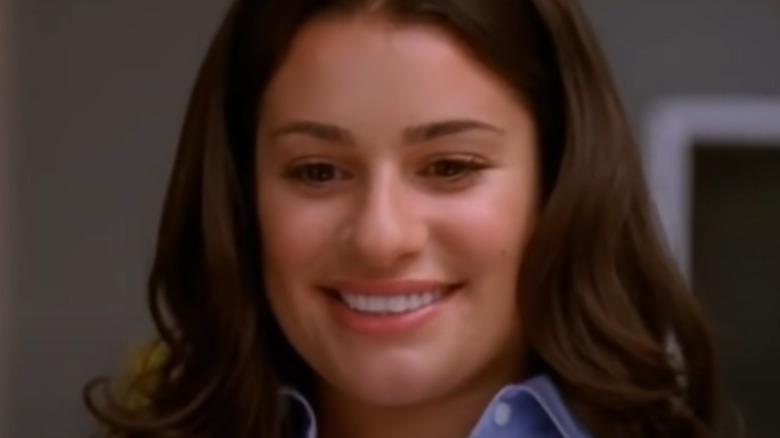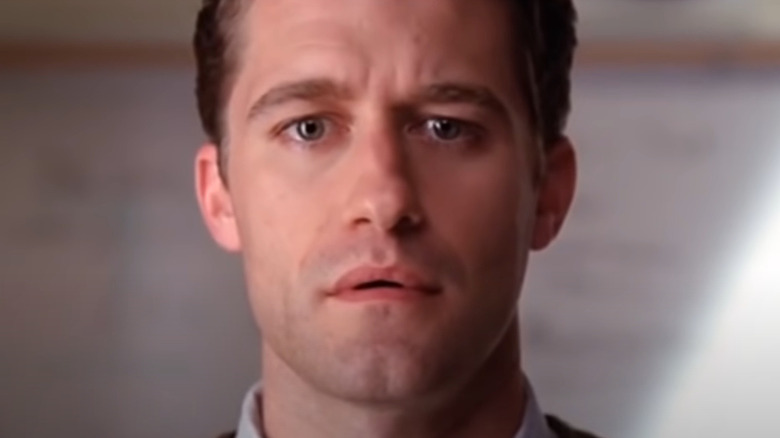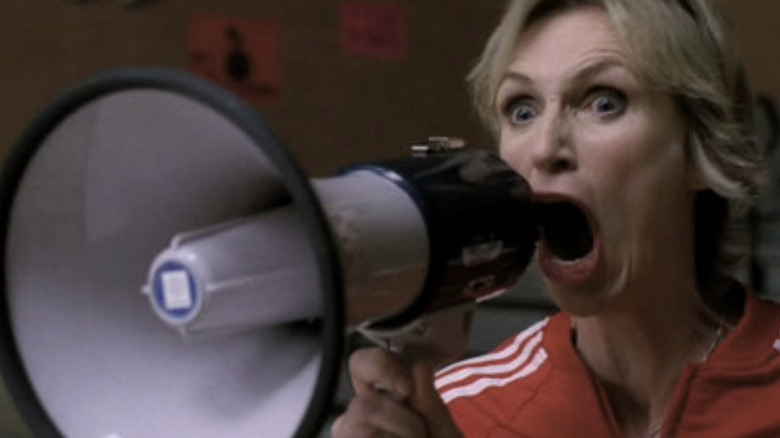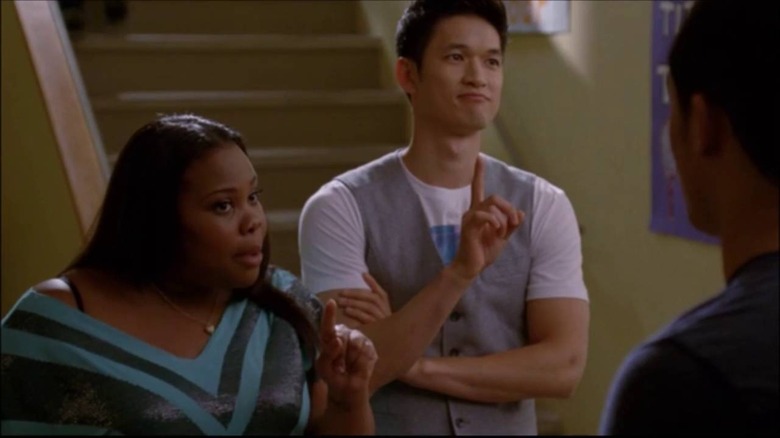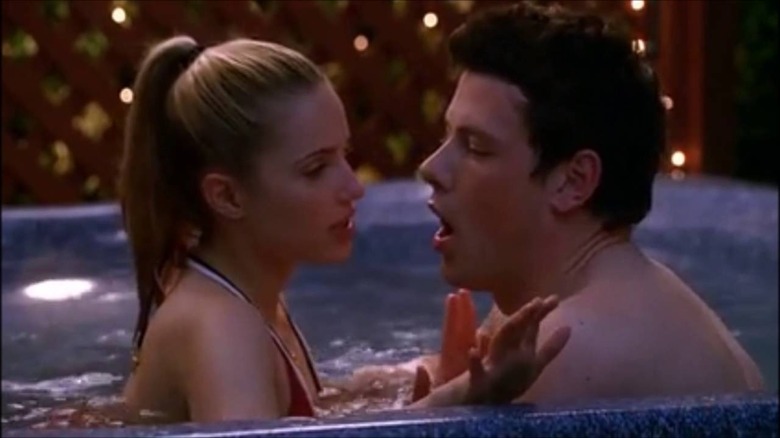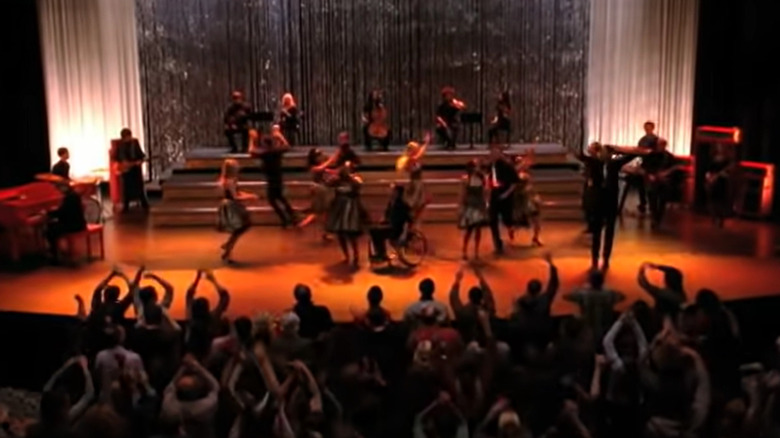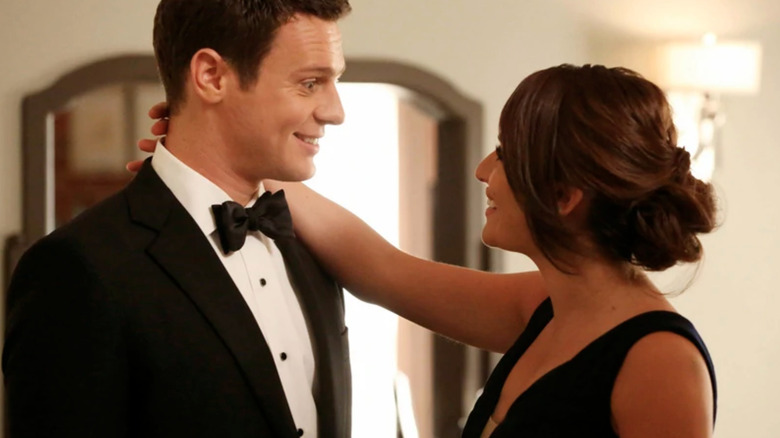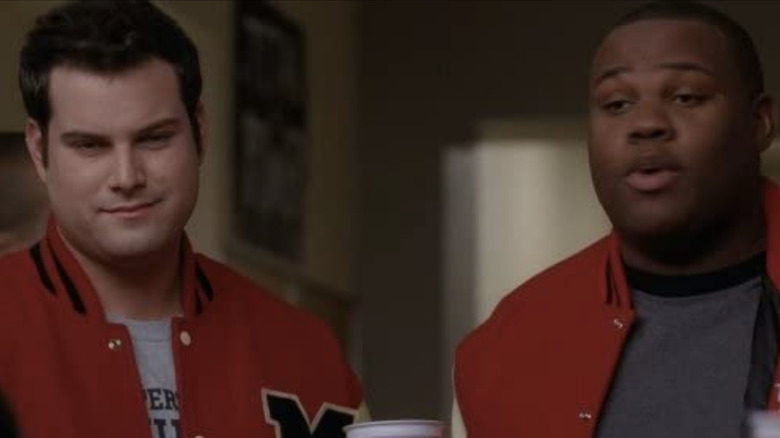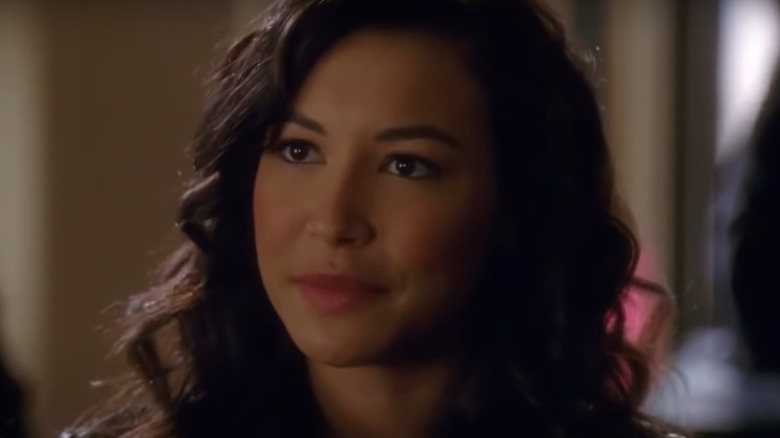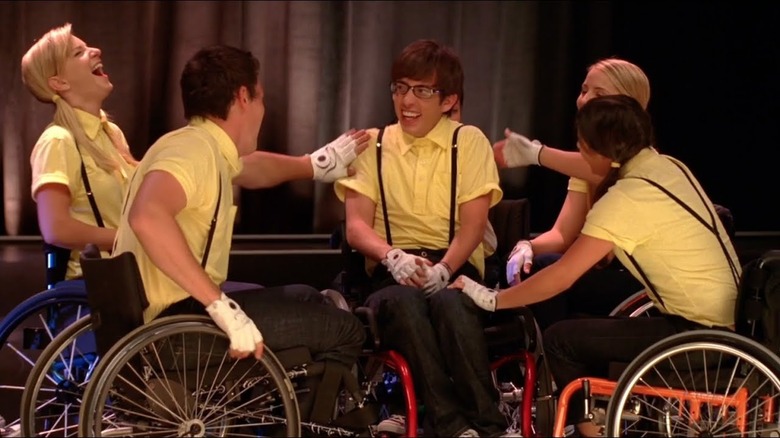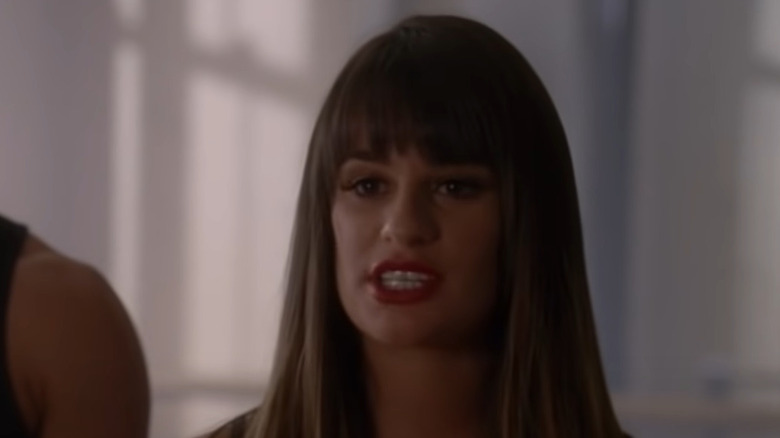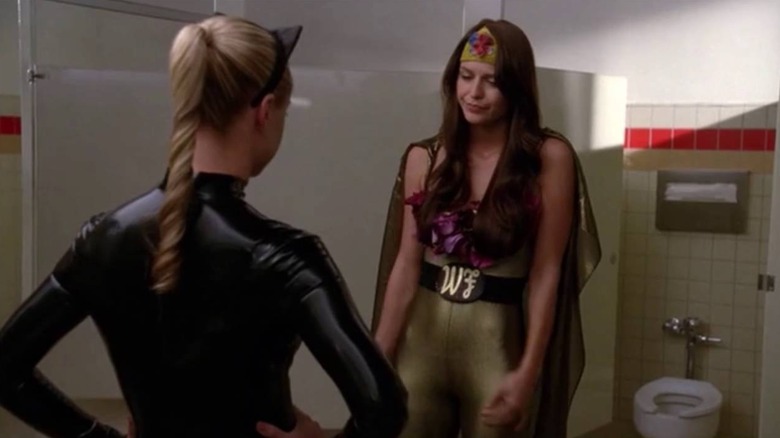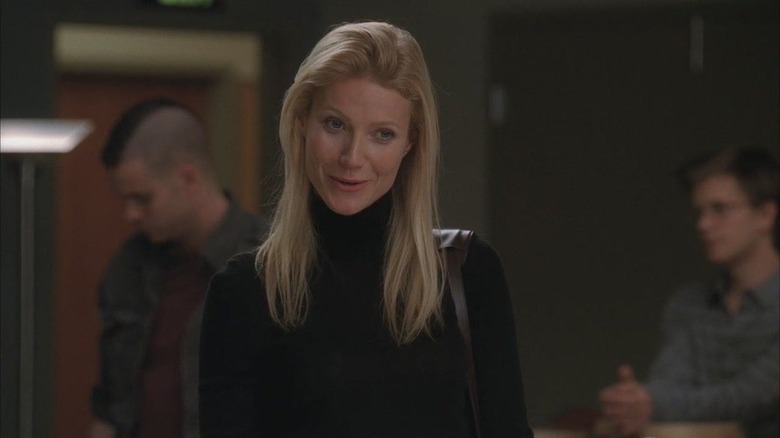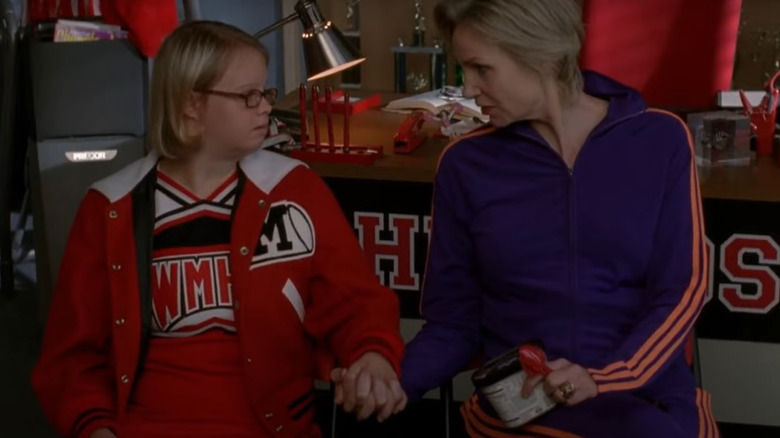Questionable Things We Ignored In Glee
When "Glee" first premiered in 2009, it was groundbreaking for its largely teenage demographic. Due to the frequent LGBTQ+ storylines the show tackled and the heavy musical content, the show quickly became a haven for theater nerds and outcasts around the world. Throughout its six seasons on the air, "Glee" taught an entire generation to follow their dreams in the face of judgment and cruelty. The series helped set the tone for normalizing more diverse storylines regarding gender and sexual orientation. Unfortunately, many of the show's plotlines are also tinged with racism, homophobia, and ableism, all while frequently taking feminism back 15 steps in any given episode.
The school setting of "Glee" provided a great opportunity to address these problems as the show continued, but it repeatedly failed to do so over the course of its initial TV run. The teachers are often worse than the students, and any character development that the McKinley High School crew manage is almost immediately retconned, leading to a repetitive slate of character arcs and a lot of unaddressed problematic content. Here are some of the big issues we should probably stop ignoring about "Glee."
Due to the content within the series, this article features fictional accounts of sexual assault, attempted suicide, eating disorders, hate crimes, bullying, and gun violence.
Mr. Schue has absolutely no boundaries
Will Schuester, AKA Mr. Schue, may get the teacher of the year award at McKinley High when he brings the Glee club to a Nationals victory in Season 3, but the guy probably should have been fired in the pilot episode. Having no boundaries whatsoever seems to be a McKinley High selling point, but Mr. Schue takes that trait 10 steps too far throughout the show without facing any significant consequences.
He constantly inserts himself into the glee kids' performances, going so far as performing sexual dance moves with and in front of students, as seen in Season 2's "Toxic" number. In an attempt to relive his glory days, Schue often takes roles from his students, like stealing Rocky from Sam in the "Rocky Horror Picture Show" musical. Will says that the part is too inappropriate for one of his students to play, but how exactly is it better for a teacher to play the part alongside a bunch of teenagers?
Even worse, Mr. Schue's sexually charged "Don't Stand So Close to Me/Young Girl" mashup — performed for a student who's crushing on him — crosses so many lines. In the pilot, Will even blackmails Finn by putting cannabis in his locker to get him to join the glee club and creeps on him in the shower to do so. Then there's the April Rhodes issue — a fully grown woman he enrolls to join the glee club. She gives them alcohol, sleeps with them, and steals their spotlight, and yet Will still lets her perform in a desperate ploy to win. Between his hyped-up sexuality and his clear inability to speak Spanish — he's the Spanish teacher — he really shouldn't have a job.
Sue physically abuses students
The most significant difference between Mr. Schue and Coach Sylvester is that the former is lauded as a groundbreaking teacher, while Sue is widely recognized as a bully. As it turns out, they're both pretty terrible in their own ways. Not only is Sue verbally abusive and terrible to her students, but she frequently shoves kids in the hallway when she's on a rampage.
Her loveliest attributes include calling Kurt "Lady Face" for a significant amount of time, using racist language, shaming her Cheerios cheerleaders for their personal lives, and screaming at everyone like a petulant toddler until she gets her way. Though she has some redeeming moments, like voting for New Directions in Season 1 and being sweet to her sister and Becky, we're just expected to forget about her toxicity the minute she shows an ounce of character growth. Yet like clockwork, any humanity and development revert at the start of the next school year.
Being in a leadership position comes with the responsibility of acting like it and putting students first, but no one in the school does anything substantial to curb Sue's behavior. She even gets the principal to hire back someone fired for inappropriate behavior with a student, and she gets herself hired back the same way. When she's not infecting Principal Figgins with dangerous diseases or staging a fake affair, Sue's asking her students to donate sperm. McKinley High just needs to clean house.
The racist undertones aren't even subtle
It's not enough just to have diverse representation onscreen — not when it's frequently used as the butt of tasteless and harmful jokes. For example, Mike Chang first appears in "Glee" Season 1 Episode 4, yet everyone calls him "the other Asian" until Episode 11 when Puck finally uses his real name. Of course, he only does so in an attempt to cover for sexting Santana in front of Quinn.
Fans get another taste of blatant racism when Mercedes suggests performing more diverse songs. Rachel's response? "It's glee club, not krunk club." Later in Season 2, Rachel speaks to Sunshine — a foreign exchange student — in a slow and offensive manner despite her explaining that she's fluent in English. Mr. Schue thanks Sue for teaching him a lesson about spotlighting students of color that same season, but he immediately loses the message. "You're all minorities," he declares to his students. "You're in the Glee club."
Sorry, Schue, but you don't get to equate racial discrimination with being a high school outcast. Even after that, Schue rarely gives parts to students of color and resists widening the genres they sing, to the point that Mercedes and Santana eventually quit New Directions to join a competing glee club in Season 3. Puck also has some truly offensive attempts at getting Mercedes to date him. None of this is addressed in any significant way or rectified within the show.
Glee glamorizes the try again mentality
The dating culture at McKinley High and beyond is all kinds of toxic, but one of the most problematic messages in "Glee" comes from the characters' inability to take "no" for an answer. Between Rachel constantly trying to break up Finn and Quinn in the first season and Kurt endlessly hitting on Finn when he knows he's not interested, the students have a lot to learn about healthy relationships and the power of "no."
To be fair though, the teachers mirror this behavior to the kids, and neither group ever really learns. Emma endlessly flirts with Will when he's married, and Will does the same thing later on when Emma dates Carl. Even more uncomfortably, the Season 1 football coach Ken harasses Emma several times a day and even rubs spit on her car when she tells him no. He eventually wears her down so much that Emma says yes to marrying him despite being grossed out by his presence. Yet his behavior is romanticized and pitied while Emma's is largely vilified. If Ken had just accepted that she wasn't interested, it never would have gone that far. These neverending consent issues send teens the message that if they want someone, they have to push for it until the other person breaks. No. (And that was a full sentence.)
McKinley High is an arts school disguised as an underfunded public school
If you think about it for more than five minutes, McKinely High itself makes no sense. The "Glee" writers hammer in that arts are the lowest priority in this financially struggling school and that the majority of funds get funneled into the Cheerios. Yet despite the glee kids getting harassed and bullied at every turn by students and even teachers, the music never dies. No matter where a scene takes place, someone is playing an instrument or singing, and the random onlooking kids are always ready to join in by dancing and putting on a show alongside the gleeks. There are usually four or five kids who randomly jump in with an instrument in hand, knowing every song perfectly to boot.
The frequent tagline that McKinley has no money for the arts is overshadowed by things like removable stages and lights, the expensive props, and the ritzy costumes that they occasionally try to play off as hand-made. The scenes for musicals and shows also always look professional-grade, with water machines, lifts, and other glitzy add-ons that would cost tens if not hundreds of thousands of dollars. You can't just change what the school is when you need flashy musical numbers, but "Glee" does just that again and again.
Rachel's (un)happy ending
Was anyone, including Rachel herself, happy when she ended up with Jesse in the "Glee" Season 6 finale? Prior to Corey Monteith's tragic death, creator Ryan Murphy planned on having Rachel settle down with Finn in Lima after accomplishing her Broadway dream (per EW). Now, that in itself would have been a complicated ending because there's no way Rachel Berry would settle down in Ohio after getting a taste of Broadway, and there are plenty of schools for Finn to teach at in New York. However, pairing her off with Jesse is even worse.
Jesse's most charming moments include seducing Rachel to manipulate her into finding her birth mother, dumping her straight away, and tormenting both her and the glee club. He not only lets his team egg Rachel in Season 1, but Jesse cracks an egg on her face himself. Sure, people grow up from the stupid things they do in high school, and he does eventually (sort of) apologize.
Regardless, they have way too much baggage for their recoupling to make sense without any new build-up or resolution. Jesse does the bare minimum to make amends with Rachel in Season 3 by recommending her to the NYADA's Carmen Tibideaux. But does that really make up for smashing an egg on the face of your vegan ex? Instead of pairing off Rachel with someone random that we'd never met or just letting her be single and bask in the joy of her Broadway success, she's forced back into a relationship that just doesn't make sense.
Unaddressed toxic masculinity
Almost all of the male characters in "Glee," even those touted as protagonists, repeatedly display toxic ideas of being "manly." The members of the football team constantly beat up nerds and glee club members, toss them in the trash, throw slushies at them, and make homophobic remarks when any guys act in a way that they deem "girly." Sometimes, the teachers will mildly step in to combat this toxic culture — like Coach Beiste making the football team join the glee club for a week. However, once the football team stops forcing everyone to keep up their stereotypical jock image, the hockey team starts carrying on the tradition.
The characters occasionally see some growth, but they quickly fall back into the same patterns. The dialogue paints the women as prizes to win, and even characters like Artie, whom the show presents as a docile sweetheart, are frequently guilty of misogynist language. Finn even throws a gay slur at Kurt when he decorates their room with what Finn regards as a feminine touch. The school does little to nothing to combat students' bullying and physical abuse. When Karofsky threatens to kill Kurt, he's back at school the following week. What gives, McKinley?
If you or a loved one has experienced a hate crime, contact the VictimConnect Hotline by phone at 1-855-4-VICTIM or by chat for more information or assistance in locating services to help. If you or a loved one are in immediate danger, call 911.
Harmful LGBTQ+ representation
"Glee" may have a record number of LGBTQ+ characters for its time, but that doesn't mean that all of the storylines surrounding those characters are positively or accurately presented. When students aren't mercilessly tormenting their LGBTQ+ McKinley High classmates, teachers and students alike are fetishizing them. No, Sue, locking Kurt and Blaine in an elevator to make out is not being an ally — nor is suggesting a student go to Thailand if they're "an Eve who was born a Steve."
Even the show's queer characters are guilty of transphobic and biphobic remarks, like Kurt's statement that "Bisexual is a term that gay guys in high school use when they want to hold hands with girls and feel like a normal person for a change." In Season 3, Finn (unintentionally) outs Santana when he's throwing down with her in the hall, and a student overhears. However, he faces no consequences, and though he seems to feel bad, he still extorts her to get what he wants.
Later on in the show, Coach Beiste comes out as transgender in a storyline that was certainly groundbreaking at the time, but which in retrospect is marred by a number of problematic tropes as well. The way Beiste's transition is written reinforces the harmful and false stereotype that many trans men are simply masculine women who decide to undergo transition. Looking back, it surely would have been better to introduce a new trans character and cast someone more appropriate to play them.
There's ableism at every corner
At first glance, Artie and his wheelchair may seem like groundbreaking inclusions for a theater show, but the unchecked treatment he often receives from the writers and characters reeks of ableism. When the glee kids are being jerks about raising money for a bus to accommodate Artie's wheelchair, Schue makes all of the kids use wheelchairs for a week, which is just showmanship with no substance. The kids learn nothing meaningful about how Artie's disability affects his life, and Finn even uses his wheelchair to get himself a job when Rachel threatens a business with a lawsuit if they don't hire him.
Artie also has several daydreaming dance scenes throughout the show, which only drive home the fact that the show decided not to cast an actor who uses a wheelchair in real life. To make matters worse, when the kids help Schue propose to Emma, Artie tosses himself into the pool with his wheelchair as part of the choreography — a baffling decision all around. In Season 3, Quinn gets into an accident that temporarily paralyzes her, and she chooses to use the injury to win sympathy for prom queen votes. Though she does ultimately give the title to Rachel, it's frustrating to once again see this plotline used so selfishly. Who thought any of this was a good idea?
Glee downplays harassment and assault
Like most of the harder-hitting topics in "Glee," sexual harassment and assault are often handled with a reprehensible level of flippancy and insincerity. We first see it weaponized in the pilot when Rachel reports the former glee teacher for touching a student inappropriately — which she only does to get a solo. The creepy school reporter kid Tracy even extorts Rachel to give him a pair of her underwear and tries to coerce her to let him grope her in exchange for controlling what he posts. And that's on top of trying to force her into a kiss multiple times. Later in the show, Ryder's classmates downplay his sexual assault just because another teenager did it. Spoiler alert: Men can be assaulted, too — even by someone their own age.
During "West Side Story," Artie is lauded as an amazing director even though he pressures Blaine and Rachel to have sex with their boyfriends to be "more authentic to show," almost breaking up both couples. The teenagers constantly pressure each other to hook up before they're ready, and the girls shame each other all the time. Sexual assault and consent should always be taken seriously, but extra care needs to be present in shows targeted at young viewers. "Glee" flunks that test repeatedly.
If you or anyone you know has been a victim of sexual assault, help is available. Visit the Rape, Abuse & Incest National Network website or contact RAINN's National Helpline at 1-800-656-HOPE (4673).
Eating disorders are weaponized
You might not be surprised at this point to know that "Glee" makes some major missteps in its handling of body shaming and eating disorders. Sue feeds her Cheerios shakes laced with vomit-inducing additives, frequently fat-shames them, and threatens to kick them off the squad because of their appearances. It's bad enough that Santana feels the need to get breast augmentation before she's even done growing, but Sue punishing her for it makes it 10 times worse.
The students are terrible to each other, too, and it's not just the women. Santana mocks Finn for having "man boobs," and he gets bullied for a shirtless scene. Even more deceptively, Kitty alters Marley's shirts to stop fitting to the point where she develops an eating disorder. The only person who's ever really called out any of this behavior is Mercedes in a single episode, but the school culture doesn't change.
If you are struggling with an eating disorder, or know someone who is, help is available. Visit the National Eating Disorders Association website or contact NEDA's Live Helpline at 1-800-931-2237. You can also receive 24/7 Crisis Support via text (send NEDA to 741-741).
Problematic depictions of mental health struggles
Another day, another stigma being perpetuated on "Glee." It's no surprise that mental health issues would often be used for cheap laughs with the show's handling of other weighted subjects. Substitute teacher Holly Holiday isn't particularly good at her job, but she takes things way too far when she mocks bipolar disorder in Season 2 by making a Mary Todd Lincoln impression and telling her students to "practice your bipolar rants."
"Glee" Season 3 is even more problematic in its handling of suicide. The episode "On My Way" features a primary plotline dealing with the topic through the character of Dave Karofsky, but the handling of that plotline is questionable at best. From scenes that are far too graphic to Principal Figgins announcing a suicide attempt to the entire school, there are a lot of harmful elements at play. To make matters worse, Sugar makes a suicide joke in the episode on top of either faking or dramatizing Aspergers as an excuse to say whatever she wants. The girls in the show are often dramatized and painted as crazy, and the school counselor Emma rarely actually helps the kids with their struggles because she's uncomfortable with most of the topics.
If you or anyone you know is having suicidal thoughts, please call the National Suicide Prevention Lifeline at 1-800-273-TALK (8255). If you or someone you know is struggling with mental health, please contact the Crisis Text Line by texting HOME to 741741, call the National Alliance on Mental Illness helpline at 1-800-950-NAMI (6264), or visit the National Institute of Mental Health website.
Becky bringing a gun to school
When it was announced that "Glee" Season 4 would have an episode tackling the subject of school shootings titled "Shooting Star," it was easy to predict that it would be problematic. The U.S. epidemic of school shootings is an incredibly important topic to address, but only if it's done the right way to speak on the issue and not sensationalize it for drama. In the episode, Becky — a student with Down syndrome – brings a gun into school and accidentally fires it as a panic response to everyone graduating. No one gets hurt, but the plotline is deeply problematic for a number of reasons. It furthers the harmful and inaccurate notion that neurodiversity is inherently dangerous, and it avoids the real issues surrounding teenage gun violence.
On a related note, it's questionable at best that Sue has Becky do her villainous bidding throughout the show, like stealing Christmas presents from charity and sabotaging the glee club. Sue's villainous mentorship is presented as wholesome, but it's also pretty clearly twisted and manipulative.
